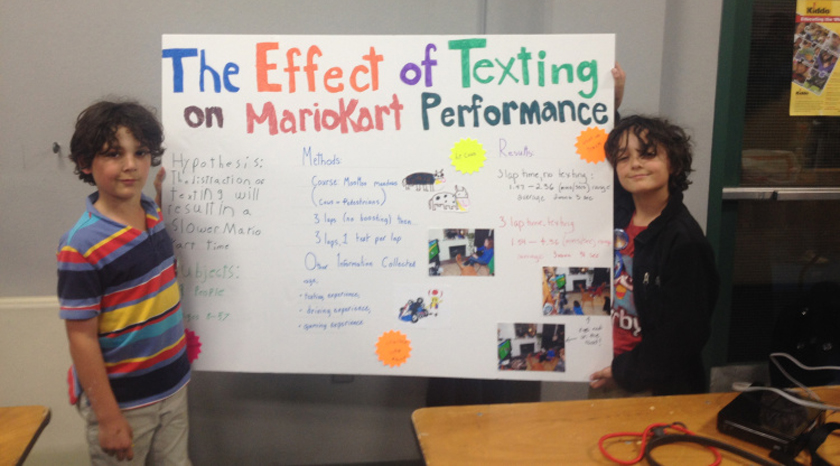Mario and texting make a fun science fair project

Jen Gunter’s twin 10-year-old boys presented research at their science fair showing that texting hurts MarioKart performance.
J. Gunter
Share this:
- Share via email (Opens in new window) Email
- Click to share on Facebook (Opens in new window) Facebook
- Click to share on X (Opens in new window) X
- Click to share on Pinterest (Opens in new window) Pinterest
- Click to share on Reddit (Opens in new window) Reddit
- Share to Google Classroom (Opens in new window) Google Classroom
- Click to print (Opens in new window) Print
Science fairs can leave parents scrambling for project ideas. Jen Gunter, an obstetrician and gynecologist in San Francisco, Calif., decided not to go with any of the ideas on popular science fair websites. She thought outside the box and came up with a fun idea that let her sons combine science with their love of video games.
At first, Gunter says, she and her twin 10-year-old sons “looked at a bunch of more traditional science fair projects.” Many sites suggesting topics leaned very heavily toward engineering or physics. But, Gunter explains, “my kids aren’t so interested in those subjects and I don’t want to drag them kicking and screaming into science.”
Another parent might have been tempted to fall back on the old baking-soda volcano. Not Gunter. “My kids are really social,” she says. “So I thought, why not look at behavior?” And that’s when Gunter recalled a paper that came out a few weeks ago in the January 2 New England Journal of Medicine.
It showed that drivers who performed tasks while driving (like texting or making a phone call) faced an increased risk of crashing their cars. A video that accompanied the paper described the study and how its authors had tested their hypothesis.
Gunter showed it to her twins and suggested they come up with a similar experiment. And they did. Instead of having adults drive real cars, they asked other kids to play the Nintendo game MarioKart (which requires no driver’s license).
The family decided to look at whether texting during play changed how often a player hit obstacles (in this case, cartoon cows) or drove off the track. With help from a friend’s 16-year-old son, Gunter and her kids recruited teen volunteers with a promise of tacos. Each volunteer played Mario Kart on the same track and with the same car. For one trial, they played without distractions. Another time they received three text messages to which they had to respond.
The twins collected all of the data — and participated too. Texting increased the odds of driving into a fence or colliding with a cow, the boys found. Gunter’s kids presented their data at their fifth grade science fair. And they brought along a Nintendo Wii to let visitors try the experiment themselves.
Gunter describes the family project and its results in her blog. As they ran the experiment, Gunter’s sons learned how to set up a study and how to control different variables, applying the scientific method.
Gunter hopes the MarioKart project will give her sons and their study’s participants food for thought about texting and driving. Her family is already planning a follow up. “We are thinking about looking at how other people in the ‘car’ affect performance in Grand Theft Auto,” says Gunter.
If you are a parent looking for a science fair idea, Gunter advises that you think outside the box.
“You can get kids excited about scientific methods with any kind of question,” she says. “If you ask a question and design a valid way to answer it, that’s science.”
Power words
behavior The way a person or animal acts towards others, or conducts itself.
engineering The field of research that uses math and science to solve practical problems.
physics The scientific study of the nature and properties of matter and energy. Classical physics is an explanation of the nature and properties of matter and energy that relies on descriptions such as Newton’s laws of motion. It’s an alternative to quantum physics in explaining the motions and behavior of matter.
social science The scientific study of people and their relationships to each other.